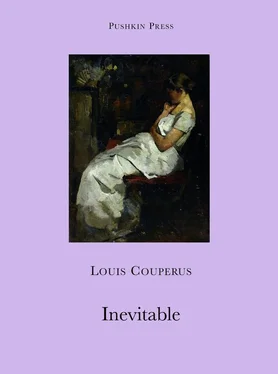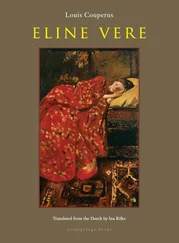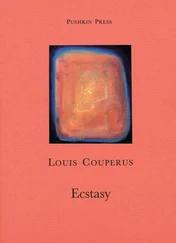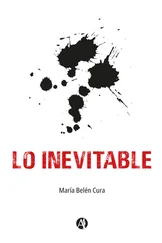He saw them in front of him. He sent the shafts of the columns soaring upwards, he fluted the severe Doric column, he bent the soft Ionic capital around it, and made the Corinthian acanthus spread its leaves; and the temples shot upwards on their columns in a trice; the basilicas arched upwards as if by magic, the statues gestured white against the elusive depth of the sky, and the Via Sacra was alive. He found it beautiful, he was living in his dream, his Past. It was as if he had had a previous existence in ancient Rome, and did not see the modern houses, the modern Capitol and all of them surrounding the grave of his Forum, before his eyes. He could sit like that for hours, or wander, or sit down again and be happy. In the intensity of his imagination he evoked history, it rose like a cloud from the past, at first like a fog, a magic mist, from which the figures soon emerged clearly, against the marble background of ancient Rome. The gigantic dramas were enacted before his dreaming eyes as if on an ideal stage, which extended from the Forum to the hazy sundrenched blues of the Campagna; with wings that were submerged in the depths of the sky. Roman life came alive in gestures, in the movement of an arm in a toga, a line of Horace, a sudden vision of the assassination of an emperor or a gladiatorial contest in the arena. And just as suddenly the image faded, and he saw the ruins, just the ruins, as the tangible shadow of his unreal illusion: he saw the ruins as they were, discoloured brown and grey, eaten away with age, crumbling, tortured, mutilated by sledgehammers, until only a few columns still stood shaking under the weight of a trembling architrave, and threatened to collapse. And the brown and grey was so richly gilded by streaks of sunlight, the ruins were so splendid as they crumbled, so melancholy in the unconscious randomness of their broken lines, cracked arches and defaced sculpture, that it was as if he himself, after his airy vision of radiant dream architecture, had tortured them with his artist’s hand, and caused them to crack, and shake and tremble, for the sake of the melancholy afterglow. Then his eyes would grow moist, his heart would overflow and he would walk away, under the arch of Titus past the Colosseum, on through Constantine’s arch, and hurry past the Lateran to the Via Appia and the Campagna, and his stinging eyes would drink in the blue of the distant Alban hills, as if that could cure them of too much gazing and dreaming …
Neither in his mother nor in either of his sisters could he find any trace of sympathy for his eccentric inclinations, and after that one friend who had died, he had never found another and as if by predestination that never allowed him to encounter sympathy, he had borne an inner and outer solitude. But he had populated his solitude so densely with his dreams that he had never felt unhappy, and just as he enjoyed wandering alone among ruins and along byways, he also loved the intimacy of his solitary studio, with a multitude of silent silhouettes on an old fragment of triptych, on a tapestry or on the many sketches fixed to the wall close together, all around him, all with the charm of their lines and colours, all with the silent gesture of their movement and emotion, and merging with the gloom of crannies and the shade of ancient cabinets. And among these dwelt his porcelain and bronze and antique silver, and the tarnished gold braid of an ecclesiastical robe shone dully, and the leather bindings of old books stood in a cheerful row, books from which, opened in his hands, the many figures rose up in a mist, living out their love and pain in those muted browns and golds of the silent atmosphere of the studio. Such was his simple life, without much self-doubt, since he did not demand too much of himself, and without the melancholy of a modern artist, because he was happy in his reflections. He had never met many people, despite the hotel existence he shared with his mother and sisters — he slept and ate at Belloni — or dealt with strangers, and by nature he was rather wary of tourists with Baedekers, of English ladies in short skirts, with their identical exclamations of identical admiration, and felt entirely out of place in the circle — half Italian, half cosmopolitan — of his quite worldly mother and elegant sisters, who danced and cycled with Italian princes and young dukes.
And now that he had met Cornélie de Retz he had to admit how little he knew about people and how he could never have conceived of the nature of such a woman — in a book perhaps, but not in reality. Her very appearance — her pallor, the fragile charm, her weariness — had astonished him, and what she said astonished him even more: the conviction and at the same time hesitancy, the artistic sensibility yet the striving to speak in a voice appropriate to her age: an age that he had not yet been able to see as an artist, infatuated as he was with Rome and the Past. And her words astonished him, with their congenial sound, and irritated though he often was by that often bitter, cutting, and then again dull and discouraged tone, until he thought about them again and again, until in his mind he heard them again from her own lips, until she joined the heads and torsos of his studio, and loomed up before him in the soft lily-like presence of her perceived reality, amid the Pre-Raphaelite stiffness of lines, and Byzantine golds of the angels and Madonnas, in canvases and tapestries.
His heart had never known love and he had always regarded it as imagination and poetry. In his life there had never been anything but the natural urge of his manhood and the usual affair with a model. And his ideas about love wavered in too broad and too unreal an equilibrium, without transition or gradation, between a woman who would strip naked for a few lire and Laura; between the desire for a beautiful body and exultation over Beatrice, between flesh and dream. He had never thought of a meeting of soulmates; had never longed for affection, love in the full, burgeoning sense of the word and the concept. And he was not aware that he was now thinking, a great deal, about Cornélie de Retz. In the past he had thought for days, a week about a woman in a poem; never yet about a woman in real life.
And the fact that, though annoyed by some of her words, he nevertheless saw her image with its lily-like outline against his Byzantine triptychs, like a phantom in his dreamer’s solitude, almost frightened him, since it had deprived him of his peace of mind.
IT WAS CHRISTMAS and on the occasion of this festival the Marchesa Belloni offered her guests a tree in the drawing-room, and afterwards a ball in the historical Guercino dining-room. Giving a ball and a tree was the custom with many hoteliers, and those pensioni where there was no ball or tree were well known and harshly criticised by foreigners for this break with tradition. Examples were known of very good pensioni , to which many travellers — especially ladies — would not go, because there was neither a tree nor a ball at Christmas.
The marchesa thought her tree expensive and her ball not cheap either and would happily have found some pretext for making both vanish as if by magic, but she did not dare: the reputation of her pensione rested precisely on its worldliness, its chic: dinner in the beautiful dining-room, where one dressed for the occasion, and a splendid party at Christmas. And it was fun to see how keen all those ladies were to receive on top of their bill for the winter a vulgar Christmas present and the opportunity to dance with free almond drink and a cake, a sandwich and a broth. The old, nodding head waiter, Giuseppe, looked down on these festivities with contempt: he remembered the galas of his archducal evenings and found the ball inferior and the tree a sorry sight; the limping doorman, Antonio, used to his relatively peaceful existence — meeting a guest or taking them to the station — calmly sorting the post a couple of times a day, and apart from that lazing around in and near his cubicle and the lift — hated the ball because of all the people invited by the guests — each of them was allowed three invitations — because of all the tiring fuss about carriages, when on top of that the guests managed to get quickly into their fiacre without paying him a tip. Consequently around Christmas-time, the mood between the marchesa and her two senior dignitaries was far from harmonious, and during those days a torrent of orders and curses beat down on the backs of the old chambermaids, who with their kettles of hot water in their trembling hands clambered laboriously up and down the stairs, and the youthful milksops of waiters who in their reckless keenness charged into each other and broke plates. And only now that the whole staff had been set to work was it apparent how old the chambermaids were, and how young all the waiters, and people found the marchesa ’s thrifty policy of employing only old crocks and children “a shame and shocking”. The only muscular facchino , required to lug suitcases, cut an unexpected figure of masculine maturity and robustness. But the marchesa was hated mainly for the large number of her serving staff, realising that now, at and around Christmas, they had to give them all a tip. No, they had not known there were so many staff. Not that many were needed anyway! If the marchesa were to take on a few strapping young girls and menservants! And there were silent conspiracies in the corners of corridors and agreements on how much they would give as a tip: people were anxious not to spoil the staff, yet they were staying all winter, and so one lira was too little, and so people were hesitating between one lira twenty-five and one lira fifty. But when people worked out on their fingers that there were at least twenty-five staff and so one was spending close to forty lire, they found it alarming and organised subscription lists. Two lists circulated, one of one lira, and one of twelve lire per guest, for the whole staff. On the latter list some, who had come a month earlier or were intending to leave, signed for ten lire, and some for six lire. Five lire was generally considered too little, and when it became known that the scruffy aesthetic ladies wanted to pay five lire, they were regarded with the utmost contempt.
Читать дальше












